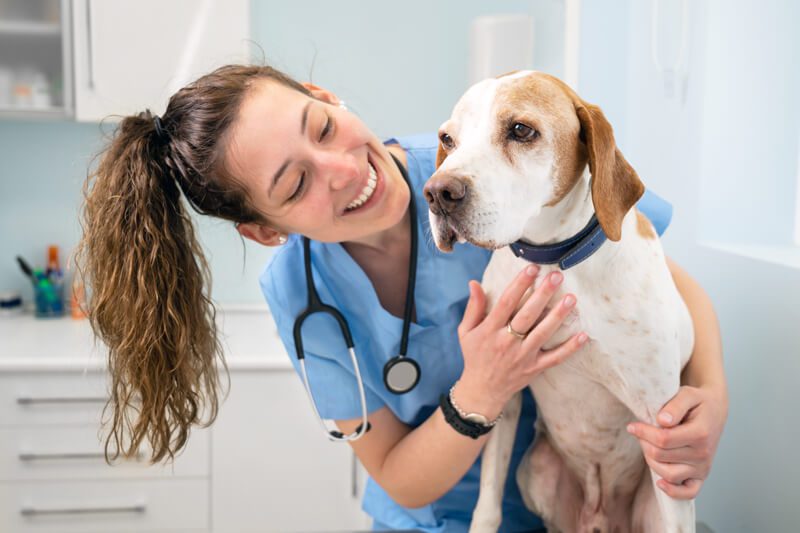Comprehensive Guide to the Solutions Offered by a Vet Oncologist
Veterinary oncology incorporates a broad range of services focused on dealing with and diagnosing cancer in pets. Veterinary Cancer Specialist. Oncologists use sophisticated analysis techniques and supply various therapy choices tailored to each pet's needs. They also focus on supportive care and give beneficial resources for animal proprietors. Comprehending these services is vital for making informed choices. What particular elements of veterinary oncology can especially affect a pet dog's treatment journey?
Understanding Vet Oncology
Vet oncology is a specific area concentrated on diagnosing and treating cancer cells in pets. This self-control encompasses a large range of techniques, from medical therapies such as chemotherapy and immunotherapy to surgical treatments aimed at removing lumps. Vet oncologists are trained to recognize the special symptoms of cancer cells in various types, enabling them to tailor therapy strategies to specific patients.
In enhancement to standard therapies, vet oncology emphasizes supportive care, which plays a crucial role in boosting the lifestyle for affected pets. This consists of discomfort administration, nutritional assistance, and palliative treatment choices. Cooperation with pet dog proprietors is essential, as they are important to decision-making concerning their pet dogs' therapy paths. As research study breakthroughs, veterinary oncology remains to evolve, using brand-new hope and improved results for animals identified with cancer. Overall, this area is essential for addressing the complexities of cancer in companion animals.
Advanced Diagnostic Techniques
Advanced analysis techniques play an important duty in vet oncology, providing essential insights right into the existence and extent of cancer cells in animals. Imaging techniques such as ultrasound, CT scans, and MRI are generally employed to envision tumors and analyze their characteristics. Additionally, biopsy treatments are essential for obtaining tissue samples, permitting for conclusive medical diagnosis and tailored treatment plans.
Imaging Modalities Utilized
Imaging techniques play a crucial duty in the diagnosis and management of cancer in pets. Veterinary oncologists use different advanced imaging methods to examine growth size, transition, and presence. Radiography, or X-rays, uses an initial sight of bone and upper body conditions, while ultrasound provides real-time imaging of soft tissues, permitting in-depth evaluation of inner organs. Computed tomography (CT) enhances visualization of complicated physiological frameworks and allows 3D repairs, helping in precise growth localization. Magnetic vibration imaging (MRI) is indispensable for soft tissue differentiation, specifically in mind tumors. Furthermore, nuclear medication techniques such as positron exhaust tomography (FAMILY PET) help determine metabolic task within growths. Jointly, these methods enhance analysis precision, leading efficient therapy strategies for oncological individuals.
Biopsy Treatments Clarified
Adhering to the preliminary assessment via imaging methods, getting a clear-cut medical diagnosis usually requires tissue sampling through biopsy treatments. Veterinary oncologists use different biopsy methods based on the tumor's area and qualities. Fine needle desire (FNA) is a minimally invasive technique that draws out cells for cytological assessment, suitable for shallow masses. Core needle biopsies give larger tissue samples and work for deeper lumps, permitting for histopathological analysis. Surgical biopsies entail excising a portion or the whole growth, helping with complete examination. These treatments not just validate the existence of cancer cells however also help determine its type and quality, assisting therapy choices. Each biopsy strategy is picked thoroughly to balance diagnostic accuracy with client safety and security and comfort.
Therapy Choices for Cancer in Pet dogs
When an animal is detected with cancer cells, a range of therapy alternatives appear to assist manage the illness and improve lifestyle. Vet oncologists typically recommend a multidisciplinary technique customized to the specific animal's needs, which may consist of surgical treatment, radiation treatment, immunotherapy, or alternative treatments.
Surgical procedure is often used to get rid of growths and afflicted cells, possibly resulting in full remission sometimes. Radiation therapy intends to target and ruin cancer cells, minimizing growth size and easing signs - Board Certified Veterinary Oncologist. Immunotherapy utilizes the pet's immune system to combat cancer better, while different treatments might consist of acupuncture or natural supplements to support overall health and wellness
Each treatment option lugs its own benefits and risks, and vet oncologists function closely with pet proprietors to create a detailed plan that straightens with the animal's particular medical diagnosis and the proprietor's desires. The best objective is to enhance the pet dog's convenience and lifestyle throughout their cancer cells journey.
Chemotherapy for Animals
Chemotherapy is an usual therapy choice for pet dogs identified with cancer cells and is usually used in conjunction with various other treatments outlined by veterinary oncologists. This treatment involves the administration of details medicines designed to damage and target cancer cells, thereby reducing tumor dimension and protecting against the spread of the illness. Veterinary oncologists tailor radiation treatment procedures based on the see here kind of cancer, the animal's total health, and the preferred treatment end result.
Side effects can occur, as these drugs might additionally influence healthy and balanced cells. Common responses include queasiness, vomiting, and short-term changes in hunger - Board Certified Veterinary Oncologist. Vet oncologists are equipped to manage these adverse effects effectively, ensuring the pet dog's convenience throughout the treatment process. Routine surveillance with blood examinations and follow-up visits is necessary to analyze the family pet's action to chemotherapy and make essential adjustments. Inevitably, chemotherapy can supply considerable benefits, enhancing the top quality of life for pet dogs encountering cancer diagnoses

Radiation Therapy in Veterinary Medication
Radiation treatment works as an efficient treatment choice for pet dogs identified with local tumors, offering a targeted method to cancer cells administration. This technique uses high-energy radiation to harm the DNA of cancer cells, hindering their capacity to proliferate. It is specifically advantageous for tumors that are not open to medical removal or for cases where surgical procedure might not be practical due to the growth's location.
Veterinary oncologists tailor radiation methods based on lump kind, dimension, and location, as well as the animal's overall health. Therapy can be supplied through external beam of light radiation or brachytherapy, each with distinctive benefits. Commonly, numerous sessions are needed to take full advantage of effectiveness while reducing adverse effects.
Pet dogs may experience short-lived responses such as skin irritability, the total goal is to diminish tumors and reduce signs and symptoms, eventually enhancing the animal's diagnosis and high quality of life. As necessary, radiation treatment plays a crucial duty in detailed cancer cells treatment.
Palliative Care and Top Quality of Life
Palliative treatment in veterinary oncology concentrates on improving the lifestyle for animals encountering terminal health problems, guaranteeing comfort and dignity in their last days. This specialized technique focuses on discomfort monitoring, symptom control, and emotional support. Veterinary oncologists analyze each animal's private demands, customizing interventions to minimize pain and boost total wellness.
Strategies might consist of carrying out medications for pain relief, taking care of queasiness, and resolving various other stressful symptoms. In addition, nutritional assistance is often supplied to keep strength and enhance hunger. The emotional facet of palliative treatment is equally essential; producing a calm environment aids decrease anxiety for both animal and proprietor.
Ultimately, the objective of palliative care is to enable pet dogs to enjoy their staying time with as much happiness and dignity as possible. By focusing on convenience and high quality of life, veterinary oncologists play a vital duty in guaranteeing that family pets and their families browse this tough trip with concern and understanding.
Assistance for Pet Owners Throughout Therapy

Emotional Advice for Proprietors
Charting the psychological landscape throughout a pet dog's cancer therapy can be a frustrating experience for owners. The uncertainty surrounding medical diagnosis and prognosis can bring about feelings of unhappiness, helplessness, and anxiety. Veterinary oncologists acknowledge the significance of psychological support and usually provide advice to assist owners navigate this tough journey. Communication is vital; reviewing therapy alternatives and prospective results can reduce some worries. In addition, using confidence that psychological actions stand fosters a supportive atmosphere. Several oncology centers may additionally suggest assistance teams or therapy services customized for family pet proprietors, facilitating common experiences. Motivating proprietors to focus on self-care throughout this time around is vital, as visit our website their emotional well-being straight affects their family pet's published here convenience and general therapy experience.

Resources and Educational Materials
Steering through the intricacies of a pet dog's cancer treatment can be intimidating for owners, making access to instructional materials and reputable sources important. Veterinary oncologists commonly supply a range of handouts, sales brochures, and online materials that discuss therapy choices, prospective side effects, and care techniques. These resources help equip and debunk the procedure animal owners to make enlightened decisions. Additionally, lots of oncology facilities offer accessibility to sustain discussion forums and groups where owners can attach with others encountering similar difficulties, promoting a feeling of area. Educational webinars and seminars performed by vet specialists even more improve understanding, ensuring that owners are well-appointed to browse their pet's trip via cancer treatment with confidence and understanding.
Regularly Asked Concerns
Just How Can I Prepare My Pet Dog for a Vet Oncology Browse Through?
Preparing a pet for a veterinary oncology visit includes event clinical documents, noting signs and symptoms, and ensuring the animal fits. A tranquil demeanor and familiar things can help alleviate anxiety throughout the visit.
What Are the Indicators My Family Pet May Have Cancer Cells?
Indicators that a pet dog might have cancer cells consist of unexplained weight management, relentless throwing up or looseness of the bowels, unusual lumps or swellings, sleepiness, modifications in cravings, problem breathing, and changes in actions. Trigger vet attention is crucial.
How Can I Assistance My Pet Mentally Throughout Treatment?
Supporting an animal emotionally throughout treatment includes giving comfort, maintaining regimens, supplying gentle love, and ensuring a calm atmosphere. Taking part in peaceful play and normal companionship aids reduce tension and cultivates a complacency.
Exist Different Therapies for Animals With Cancer?
Alternate therapies for family pets with cancer include acupuncture, herbal treatments, and dietary assistance. These approaches may match traditional treatments, advertising general well-being. Consulting with a veterinarian is crucial for reliable and safe assimilation of alternative treatments.
What Expenses Should I Expect for Vet Oncology Solutions?
The expected expenses for veterinary oncology services can differ considerably, commonly affected by diagnostics, therapies, and ongoing care. Animal proprietors must plan for costs varying from consultations to specialized treatments, reflecting the complexity of cancer cells administration.
Collaboration with pet proprietors is vital, as they are indispensable to decision-making concerning their family pets' therapy courses. Each therapy choice carries its very own benefits and dangers, and veterinary oncologists work carefully with pet proprietors to design an extensive plan that aligns with the pet dog's certain diagnosis and the proprietor's desires. Pet dogs might experience short-term responses such as skin irritability, the general purpose is to shrink tumors and ease signs, eventually enhancing the pet's diagnosis and high quality of life. Assistance for pet owners throughout therapy is vital in steering via the emotional challenges linked with a family pet's cancer medical diagnosis. Preparing a pet dog for a vet oncology visit entails celebration clinical documents, keeping in mind signs and symptoms, and guaranteeing the pet is comfy.